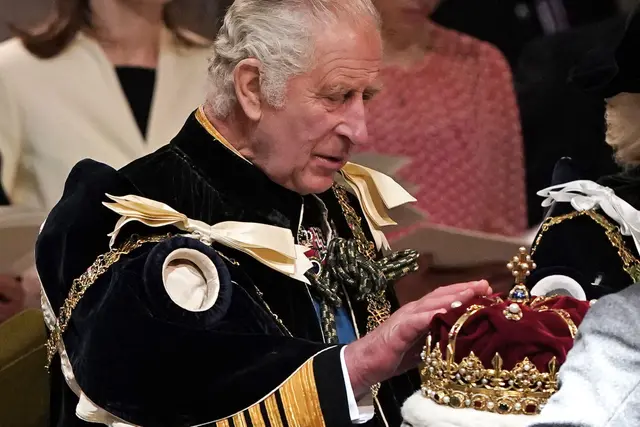By David Young And Sheila Mckenzie-
King Charles and Queen Camilla were presented with the Scottish Crown Jewels in a special ceremony to mark the coronation.
Following Charles III’s official coronation at Westminster Abbey on May 6, these Scottish jewels were presented as part of a longstanding tradition dating back to the 1800s.
Hundreds of military personnel marched through Edinburgh today before the new monarch receives a crown, sceptre and a sword made of gold, silver and gems at St Giles’ Cathedral.
King Charles III was officially crowned king on May 6 this year in special ceremony attended by dignitaries from all over the world.
A special Red Arrows flypast zoomed over the Scottish city after the ceremony to mark the occasion.
Queen Camilla, and the Prince and Princess of Wales were in St Giles’ Cathedral for the ceremony . Prince Harry and Meghan Markle were conspicuously absent from the occasion.
Scotland’s First Minister Humza Yousaf gave a reading, and there was music from violinist Nicola Benedetti
The ceremony featured personnel from across the Household Cavalry Mounted Regiment, The Royal Regiment of Scotland (SCOTS), and Scottish and North Irish Yeomanry.
It also ceremony also featured The Stone of Destiny, also known as the Stone of Scone, which was used for the coronation of Scots kings for hundreds of years before being seized by Edward I of England in 1296.
Musicians from across the Armed Forces took part in the event, including personnel from Royal Marines Band Scotland, Band SCOTS and Pipes and Drums from the Army and RAF.
The stone was returned to Scotland in 1996 after being used for Queen Elizabeth’s coronation in 1953.’
Following Charles III’s official coronation at Westminster Abbey on May 6, these Scottish jewels were presented as part of a longstanding tradition dating back to the 1800s.
Crowds gathered early on Edinburgh’s Royal Mile to watch the procession, with visitors from as far away as New Zealand and the US hoping to catch a glimpse of the King.
Unsurprisingly, anti-monarchy protesters gathered outside the High Court building, chanting: “Not my King”, as they held signs to that effect.
Some of the protesters were in possession of a banner saying “F*ck the king, feed the hungry’, which was visible on the floor.
Protest group This Is Rigged said its supporters were arrested at celebrations “for simply wearing kilts with ‘This Is Rigged’ printed on the back”.
Police Scotland arrested two women – aged 20 and 21 – after they allegedly attempted to climb over a crowd safety barrier on the Royal Mile, Edinburgh, the service said in a tweet this afternoon.
Anti-monarchy group Republic claimed three protesters were arrested. In a tweet the group said it was “demanding the immediate release of those arrested for peaceful protest”.
Our Republic, another protest group, issued a statement earlier saying: “The vast majority of Scotland didn’t care to celebrate the coronation in May, with support for the monarchy at an all-time low in Scotland.
“Charles’ perpetual need to celebrate his reign, with all the pomp and pageantry it requires, is a spit in the face to the people struggling with the cost of living.”
Protesters have always been intent on disruptive any ceremonies associted with The Royal family.
Over 700 members of the Armed Forces took part in a procession, led by Shetland pony Corporal Cruachan IV.
The mascot of The Royal Regiment of Scotland was joined by personnel from The Royal Scots Dragoon Guards and the Army Cadet Force.
‘We really loved you’: Farewell to ITV News health editor Emily Morgan
The ceremony itself featured personnel from across the Household Cavalry Mounted Regiment, The Royal Regiment of Scotland (SCOTS), and Scottish and North Irish Yeomanry.
Musicians from across the Armed Forces took part in the event, including personnel from Royal Marines Band Scotland, Band SCOTS and Pipes and Drums from the Army and RAF.
The ceremony featured some new additions, including specially written pieces of music, a psalm sung in Gaelic, and passages from the New Testament in Scots.
Violinist Nicola Benedetti was among the musicians playing, while Olympic rower Dame Katherine Grainger had the responsibility of carrying the Elizabeth Sword.
Reading
Scotland’s First Minister Humza Yousaf gave a reading at the service, while others attending from the world of politics included Scottish Conservative leader Douglas Ross, Scottish Labour leader Anas Sarwar, and Scottish Liberal Democrat leader Alex Cole-Hamilton.
Among the congregation were individuals from the people’s procession, a group around 100-strong reflecting all aspects of Scottish society from the arts and politics, to education, civil society and business, including charities which the King supports as patron.




